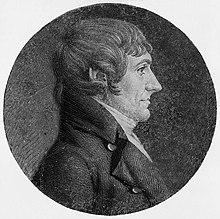William Plumer
William Plumer | |
|---|---|
 | |
| United States Senator from New Hampshire | |
| In office June 17, 1802 – March 4, 1807 | |
| Preceded by | James Sheafe |
| Succeeded by | Nahum Parker |
| 11th & 13th Governor of New Hampshire | |
| In office June 5, 1812 – June 3, 1813 June 6, 1816 – June 3, 1819 | |
| Preceded by | John T. Gilman |
| Succeeded by | Samuel Bell |
| Personal details | |
| Born | June 25, 1759 Newburyport, Massachusetts |
| Died | December 22, 1850 (aged 91) Epping, New Hampshire |
| Political party | Democratic-Republican |
| Other political affiliations | Federalist |
William Plumer (June 25, 1759– December 22, 1850) was an American lawyer and Baptist lay preacher from Epping, New Hampshire. Born in 1759 in Newburyport, Massachusetts, he represented New Hampshire as a Federalist in the United States Senate from June 17, 1802 to March 4, 1807. Plumer would later become a Democratic-Republican and serve as a Governor of New Hampshire, 1812–1813 and 1816–1819. In the 1820 presidential election, he cast the only dissenting vote in the Electoral College against incumbent President James Monroe, voting instead for John Quincy Adams. While some accounts say that this was to ensure that Washington remained the only American president unanimously chosen by the Electoral College, others assert that he was instead calling attention to his friend Adams as a potential future presidential candidate or protesting against the "wasteful extravagance" of the Monroe Administration.[1] Plumer also eschewed voting for Tompkins for Vice President as "grossly intemperate" and having "not that weight of character which his office requires," and also "because he grossly neglected his duty" in his "only" official role as president of the senate by being "absent nearly three-fourths of the time."[2] Plumer instead voted for Richard Rush.
In 1803 Plumer was one of several New England Federalists who proposed secession from the United States due to lack of support for Federalists, rising influence of Jeffersonian Democrats and the diminished influence of the North due to the Louisiana Purchase.
Plumer was a founder and the first president of the New Hampshire Historical Society. He died in 1850, aged 91, at Epping, New Hampshire.
References
- ^ How Important is One Vote?, The NSC Foghorn newsletter
- ^ Daniel D. Tompkins, 6th Vice-President (1817-1825).On the other hand, an editorial in the New York Herald-Tribune on June 21, 1932, argued that "The name of Daniel Tompkins deserves to be more kindly remembered than it has been."
External links
- United States Congress. "William Plumer (id: P000393)". Biographical Directory of the United States Congress.
- 1759 births
- 1850 deaths
- People from Newburyport, Massachusetts
- Baptists from the United States
- American people of English descent
- New Hampshire Federalists
- New Hampshire Democratic-Republicans
- Governors of New Hampshire
- Faithless electors
- United States Senators from New Hampshire
- Federalist Party United States Senators


